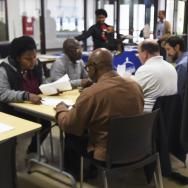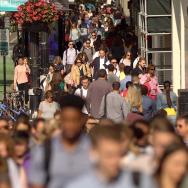What does economic and racial equity look like in Chicago? What if the city’s poorest and most vulnerable residents were not saddled with debt to the city, and had the same pathways to financial stability and economic advancement as other Chicago residents?
Stakeholders from academia, philanthropy and community activism answered those questions at a recent discussion hosted by the University’s Office of Civic Engagement and the City Club of Chicago. The event, the second in a series, was inspired by a task force convened by the Chicago City Clerk’s Office charged with exploring disparities in ticketing and debt-collection practices affecting Chicago’s lower-income and predominantly minority communities.
The School of Social Service Administration led a collaborative partnership on behalf of the University to advise and support the Chicago Fines, Fees, & Access Collaborative, which was convened in December 2018. SSA supported the research, data collection and analysis, and policy recommendations that went into the report. SSA and Loyola University Chicago students participated in public forums sponsored by the City Clerk’s office, gathering and analyzing residents’ feedback. Faculty and students from SSA, the Harris School of Public Policy and the Booth School of Business also provided advice and research, including an analysis of the city’s parking- and red-light ticket data, and policy recommendations on how best to restructure city sticker payments.
Watch the full video of the panel discussion.
During the event SSA revealed an initial set of 14 policy reforms and proposals for more equitable fee structures designed to benefit Chicagoans most adversely impacted by the current system.
An in-depth report published by Pro Publica Illinois and WBEZ in 2018 showed that Chicago leads the nation in Chapter 13 bankruptcies triggered by ticket debt. Automated red-light and speed camera tickets, as well as unpaid parking tickets and added fines, also has resulted in license suspensions and vehicle seizures. The report also found tickets for city sticker violations were disproportionately issued in majority black neighborhoods, resulting in millions of dollars of debt.
“We wanted to create immediate, as well as lasting transformational change to the current systems, to strike the right balance between equitable practices and compliance,” Chicago City Clerk Anna Valencia said.
In addition to Valencia, panelists included Helene Gayle, CEO of The Chicago Community Trust; community activist Rosazlia Grillier; and Damon Jones, an associate professor at the Harris School of Public Policy.
“We know that with the right mix of leadership, vision and research, that we can transform communities and entire cities,” said SSA Dean Deborah Gorman-Smith. “And success is possible when leaders, policymakers and committed communities work together to make systemic change.”
The panelists agreed access to affordable housing, quality education, fresh food and health care, among other needs, can improve lives as well as racial and economic equity in Chicago.
Gayle referenced a recent NYU School of Medicine study estimating a 30-year life expectancy gap between Streeterville and Englewood residents.
“That’s not about medical care, that’s about equity,” Gayle said. “There’s a lot we can do with programs. But at the end of the day it’s policies that are going to change this. Bad public policy got us to where we are today and it’s only by having good public policy that we’re going to make the kinds of changes, systemic changes, that are really going to make a difference.”
In response to a question framed as all Chicagoans needing to “suffer” to achieve economic equity for all, Jones said: “I would think about the framing differently. Everybody can share in the prosperity that can happen if we have a healthy city, uniformly, throughout all the different neighborhoods.”
—Story first appeared on the Office of Civic Engagement website.

